Utah offers over a 1000 fishable lakes and streams as well as blue ribbon fisheries such as the Green River. Utah fishing is open year around. Species range from the popular rainbow and cutthroat to large mackinaw and Brown trout to striped bass, walleye, bluegill, whitefish, the Bonneville cisco and many others.
Fishing Resources:
Buy Hunting And Fishing Licenses Online
Weekly Statewide Fishing Report
Previous Page
5 Tips for Successful Winter Fly Fishing
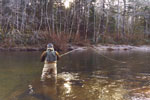 Wintertime in Utah usually signals the start of ice fishing season. Saved for the handful of dedicated anglers, fly fishing in the icy months of the year is often overlooked. Which is interesting, since winter fly fishing can offer some of the best success for Utah anglers. Fly fishing during the winter months is a bit more challenging, and not just due to the cold. These five tips will help you have a great day out on the water the next time you feel the need to bust out the fly rod.
Wintertime in Utah usually signals the start of ice fishing season. Saved for the handful of dedicated anglers, fly fishing in the icy months of the year is often overlooked. Which is interesting, since winter fly fishing can offer some of the best success for Utah anglers. Fly fishing during the winter months is a bit more challenging, and not just due to the cold. These five tips will help you have a great day out on the water the next time you feel the need to bust out the fly rod.
Winter Fly Fishing Utah
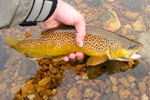 Fly fishing in the winter is a blast. It's probably one of my favorite times of year to get out and fling flies, to be honest. The crowds thin out, the rivers are slower and more manageable, and the fish seem to be just a bit more feisty as well. Of course, fly fishing in the winter means battling snow storms and the occasional flurry of ice, but those are small prices to pay for the glory of fly fishing.
Fly fishing in the winter is a blast. It's probably one of my favorite times of year to get out and fling flies, to be honest. The crowds thin out, the rivers are slower and more manageable, and the fish seem to be just a bit more feisty as well. Of course, fly fishing in the winter means battling snow storms and the occasional flurry of ice, but those are small prices to pay for the glory of fly fishing.
Catfishing Utah Lake
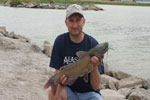 Utah lake offers two species of catfish: The channel catfish (Ictalurus puncatus) has bluish gray to silvery sides, usually with dark spots on smaller fish, and the tail has a deep fork. The Bullhead or commonly known as the Mudcat (Ictalurus melas) is smaller then the channel catfish with the average being about 12 inches. Mudcats are blackish-olive with a yellowish belly. They have a very large head that makes up most of the fishes weight.
Utah lake offers two species of catfish: The channel catfish (Ictalurus puncatus) has bluish gray to silvery sides, usually with dark spots on smaller fish, and the tail has a deep fork. The Bullhead or commonly known as the Mudcat (Ictalurus melas) is smaller then the channel catfish with the average being about 12 inches. Mudcats are blackish-olive with a yellowish belly. They have a very large head that makes up most of the fishes weight.
Navajo Lake
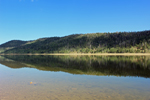 While on a southern Utah outdoor adventure which consisted of visiting the nearby Cedar Breaks National Monument, we also spent some time at Navajo Lake. This natural lake sits atop Cedar Mountain and is approximately 25 miles east of Cedar City, Utah. However, in our case a short 14-mile drive from Cedar Breaks. As we approached the lake the first view is of a large man-made dike that stretches across the eastern end. After seeing this dike, we were surprised to learn this lake is natural, and the dike is only in place to help maintain a more constant water level. The lake was originally formed when an ancient lava flow naturally dammed the eastern side of the lake valley.
While on a southern Utah outdoor adventure which consisted of visiting the nearby Cedar Breaks National Monument, we also spent some time at Navajo Lake. This natural lake sits atop Cedar Mountain and is approximately 25 miles east of Cedar City, Utah. However, in our case a short 14-mile drive from Cedar Breaks. As we approached the lake the first view is of a large man-made dike that stretches across the eastern end. After seeing this dike, we were surprised to learn this lake is natural, and the dike is only in place to help maintain a more constant water level. The lake was originally formed when an ancient lava flow naturally dammed the eastern side of the lake valley.
Crayfishing Utah
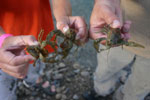 Roaming at the bottom of most Utah reservoirs are little crustaceans that have been called many names such as crayfish, crawdads or crawdaddies. Crayfish are the centerpiece of Cajun Cuisine in New Orleans, but in Utah catching and eating these critters is still a new activity that should be enjoyed by all. Catching crayfish is easy, all you need is a piece of chicken tied to a string and of course the right location and you cannot fail.
Roaming at the bottom of most Utah reservoirs are little crustaceans that have been called many names such as crayfish, crawdads or crawdaddies. Crayfish are the centerpiece of Cajun Cuisine in New Orleans, but in Utah catching and eating these critters is still a new activity that should be enjoyed by all. Catching crayfish is easy, all you need is a piece of chicken tied to a string and of course the right location and you cannot fail.
Currant Creek Reservoir
 Located 45 miles southwest of Heber Utah via highway 40 is Currant Creek Reservoir. This reservoir sits at an elevation of 8000 feet and is a popular destination for hiking, fishing and boating. Species in this lake are primarily Rainbow and Cutthroat Trout. Facilities and improvements at Currant Creek Reservoir include paved roads, parking spurs, flush toilets, dump station, boat ramp, handicap accessible fishing pier and playground.
Located 45 miles southwest of Heber Utah via highway 40 is Currant Creek Reservoir. This reservoir sits at an elevation of 8000 feet and is a popular destination for hiking, fishing and boating. Species in this lake are primarily Rainbow and Cutthroat Trout. Facilities and improvements at Currant Creek Reservoir include paved roads, parking spurs, flush toilets, dump station, boat ramp, handicap accessible fishing pier and playground.
The Duchesne River
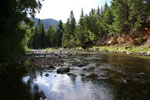 The Duchesne River and its tributaries provide miles of fly and spin fishing opportunities. The river is split into three sections, North Fork, West Fork and the Duchesne. The West Fork and the Duchesne river are considered one of Utah's blue ribbon fisheries. The West Fork flows approx 16 miles from its head waters. The upper portion flows through the Ashley National Forest making it accessible to public access.
The Duchesne River and its tributaries provide miles of fly and spin fishing opportunities. The river is split into three sections, North Fork, West Fork and the Duchesne. The West Fork and the Duchesne river are considered one of Utah's blue ribbon fisheries. The West Fork flows approx 16 miles from its head waters. The upper portion flows through the Ashley National Forest making it accessible to public access.
Highland Glen Pond
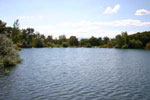 We have heard so many stories from several fisherman about how fun it is to take the kids to Highland Glen Park Community Fishing Pond. Fishing stories are fishing stories until you try it yourself, so we loaded up the kids and headed for Highland Pond. After arriving at the pond we found ourselves a nice flat shoreline location, baited the poles and started fishing. It wasn't long before I was bringing in the first Rainbow Trout of the day, as a matter of fact the fish were biting so fast I stopped fishing to wait for Dan to arrive with his kids.
We have heard so many stories from several fisherman about how fun it is to take the kids to Highland Glen Park Community Fishing Pond. Fishing stories are fishing stories until you try it yourself, so we loaded up the kids and headed for Highland Pond. After arriving at the pond we found ourselves a nice flat shoreline location, baited the poles and started fishing. It wasn't long before I was bringing in the first Rainbow Trout of the day, as a matter of fact the fish were biting so fast I stopped fishing to wait for Dan to arrive with his kids.
6 Tips to Lure Fishing in Utah’s Creeks
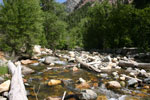 Many people who enjoy the great outdoors drive by some of Utah’s beautiful creeks and pay no attention to the possible fishing opportunities. The size, the shallow water, and the location may lead them to believe there are no fish in these waters. Most of Utah’s creeks have a population of fish. The fish are either planted by the Division of Wildlife Resources or the creeks are populated by the lakes that feed them. There are dozens of small fishable creeks within an hour of the Wasatch front.
Many people who enjoy the great outdoors drive by some of Utah’s beautiful creeks and pay no attention to the possible fishing opportunities. The size, the shallow water, and the location may lead them to believe there are no fish in these waters. Most of Utah’s creeks have a population of fish. The fish are either planted by the Division of Wildlife Resources or the creeks are populated by the lakes that feed them. There are dozens of small fishable creeks within an hour of the Wasatch front.
Fishing The Big Cottonwood Canyon Creek
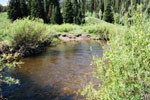 Big Cottonwood Canyon is famous for its ski resorts, hiking trails and beautiful scenery, but what about the stream that runs all the way down the canyon? This stream offers some great fishing opportunities for small pan size trout. There are several locations to access this stream, as it flows through several campgrounds and picnic areas. There are also several pullouts off the canyon road that put you within a short distance of some fantastic fishing holes.
Big Cottonwood Canyon is famous for its ski resorts, hiking trails and beautiful scenery, but what about the stream that runs all the way down the canyon? This stream offers some great fishing opportunities for small pan size trout. There are several locations to access this stream, as it flows through several campgrounds and picnic areas. There are also several pullouts off the canyon road that put you within a short distance of some fantastic fishing holes.
Utah Botanical Center
 The Utah Botanical Center offers visitors many recreational activities such as fishing, wildlife viewing, walking the trail system, visiting the Rasmussen Teaching Garden and over 100 species of trees in the arboretum. The Botanical Center was created as a place of study and focuses on critical issues facing Utah and other states throughout the Intermountain west; a growing population and limited water supplies, diminishing public open space, and a shrinking resource base for native plants, wildlife and wetland areas. The center offers hands-on fun and learning on ways to live well while using resources wisely.
The Utah Botanical Center offers visitors many recreational activities such as fishing, wildlife viewing, walking the trail system, visiting the Rasmussen Teaching Garden and over 100 species of trees in the arboretum. The Botanical Center was created as a place of study and focuses on critical issues facing Utah and other states throughout the Intermountain west; a growing population and limited water supplies, diminishing public open space, and a shrinking resource base for native plants, wildlife and wetland areas. The center offers hands-on fun and learning on ways to live well while using resources wisely.
Boating Deer Creek Reservoir
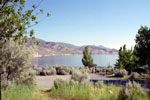 For the fisherman, pop gear and a worm have always worked for us. We usually have no problem bringing in our limit of 14 to 16 inch trout. The Walleye are always a challenge, but they can be had with a bottom bouncer and a worm. Lets not forget those pesky perch, they love worms, small jigs and spinners. Once you locate them the action can be very fast.
For the fisherman, pop gear and a worm have always worked for us. We usually have no problem bringing in our limit of 14 to 16 inch trout. The Walleye are always a challenge, but they can be had with a bottom bouncer and a worm. Lets not forget those pesky perch, they love worms, small jigs and spinners. Once you locate them the action can be very fast.
Fishing The Jordan River
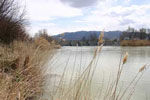 Over the last several years many efforts have been made to improve and clean up the Jordan River and restore this river as one of Utah’s urban fisheries. The Jordan River is one of Utah’s three major tributaries. The river begins its journey at Utah Lake a travels through several cities, wetlands and industrial areas, before finally ending up at the Great Salt Lake.
Over the last several years many efforts have been made to improve and clean up the Jordan River and restore this river as one of Utah’s urban fisheries. The Jordan River is one of Utah’s three major tributaries. The river begins its journey at Utah Lake a travels through several cities, wetlands and industrial areas, before finally ending up at the Great Salt Lake.
Yearns Lake
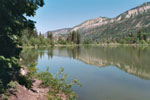 Yearns Lake is located about 7 miles up Manti Canyon. This lake offers great summer time fishing for the whole family. The Manti Community Campground is located just behind the lake. The campground offers 9 camping sites, with fire rings, pit toilets, grills, tables and more. The surrounding area is considered the Manti-La Sal National Forest. Activities in the forest include hiking, mountain biking, ATV riding, wildlife viewing and more.
Yearns Lake is located about 7 miles up Manti Canyon. This lake offers great summer time fishing for the whole family. The Manti Community Campground is located just behind the lake. The campground offers 9 camping sites, with fire rings, pit toilets, grills, tables and more. The surrounding area is considered the Manti-La Sal National Forest. Activities in the forest include hiking, mountain biking, ATV riding, wildlife viewing and more.